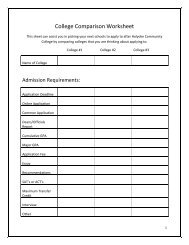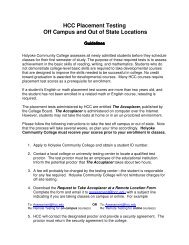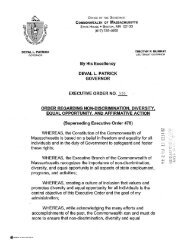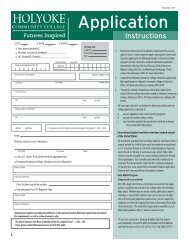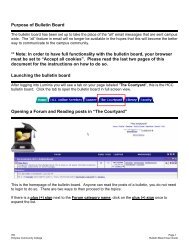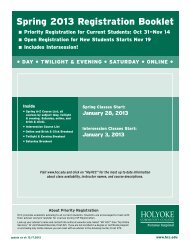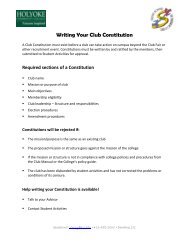Student Handbook 2010-2011 - Holyoke Community College
Student Handbook 2010-2011 - Holyoke Community College
Student Handbook 2010-2011 - Holyoke Community College
You also want an ePaper? Increase the reach of your titles
YUMPU automatically turns print PDFs into web optimized ePapers that Google loves.
. When the Dean of <strong>Student</strong> Services files orreceives a complaint alleging that a student hasacted in a manner which may be in violationof the Code, the initiates the disciplinaryprocess by meeting with the ccused tudent,putting him/her on notice of the alleged violationand providing him/her an opportunity torespond to the allegations. The may conducta further investigation if necessary.c. If the determines that a violation exists,three (3) procedural options are available. (1)Verbal or ritten arnings - For low-leveloffenses, the Dean may issue a verbal or writtenwarning to the accused student. Warningsshall not be subject to a hearing before audicial oard or an appeal. (2) AdministrativeDisposition - Under an administrative disposition,the accused student and the Dean mutuallyagree upon a disciplinary remedy. By acceptingthe administrative disposition, the accusedstudent waives his/her right to a hearing beforethe judicial board or an appeal. (3) JudicialBoard Hearing-When an administrative dispositioncannot be reached, the Dean shall referthe alleged violation to a judicial board for ahearing.Failure to cooperate with the college’s investigation ofan alleged Code of Conduct violation, which includesappearing before a udicial oard or college official ifsummoned to do so, will result in the student forfeitinghis/her rights to a hearing or appeal and/or may result indisciplinary action.Appointment of a Judicial Board:If the accused student is to appear before a judicialboard, the Dean of <strong>Student</strong> Services or designee willappoint a judicial board consisting of two (2) membersof the faculty/professional staff (one unit and one nonunit)and one (1) member of the student body with nomember having a vested interest in the matter. Thisboard shall elect its own chairperson. The Dean ordesignee may extend the time frame for each step in thehearing process.2. Judicial Board Hearinga. A hearing with the judicial board shall bescheduled by the not later than thirty(30) days following an accused student’s requestfor a hearing.b. A written statement of charges shall be presentedto the accused student not less than five(5) days prior to the hearing.c. A judicial board hearing is an administrativehearing. The rules of evidence do not apply.d. In a matter involving more that one accusedtudent, the judicial board may permit at itsdiscretion individual hearings for each accusedstudent.e. The accused student has the right to be accompaniedby any advisor of his/her own choosingand at his/her own expense. The advisor maybe an attorney. An advisor’s role is limited toadvising the accused student directly. An advisoris not permitted to participate directly inthe hearing.3. Conduct of Hearinga. A hearing is normally conducted in private.b. There shall be a record created of all hearings.The record shall be the property of the college.c. All procedural questions are subject to the finaldecision of the udicial oard.d. Admission of any person(s) to the hearing shallbe at the discretion of the judicial board.e. A hearing shall proceed as follows:The Dean presents the statement of charges onbehalf of the college. The Dean may presentdocuments, materials and/or witnesses in supportof the statement of charges.The accused student responds to the statementof charges. The student may present documents,materials and/or witnesses in response tothe statement of charges.Following the parties’ presentations, the judicialboard may question each party, their witnessesand/or review all information presented.The judicial board has the discretion to requestadditional documents, materials or informationfrom either party.While direct cross-examination by the partiesis not permitted, each party will be given theopportunity to question the other by presentingquestions through the judicial board. If theboard determines a question is relevant, theother party will be asked to respond.The board shall have a final opportunity toquestion the parties.f. After the hearing, the judicial board shalldetermine by majority vote whether the statementof charges has been proven.g. In reaching its decision, the judicial board shalldetermine whether it is more likely than notthat the accused student violated the <strong>Student</strong>Code of Conduct based on the information presented.56



